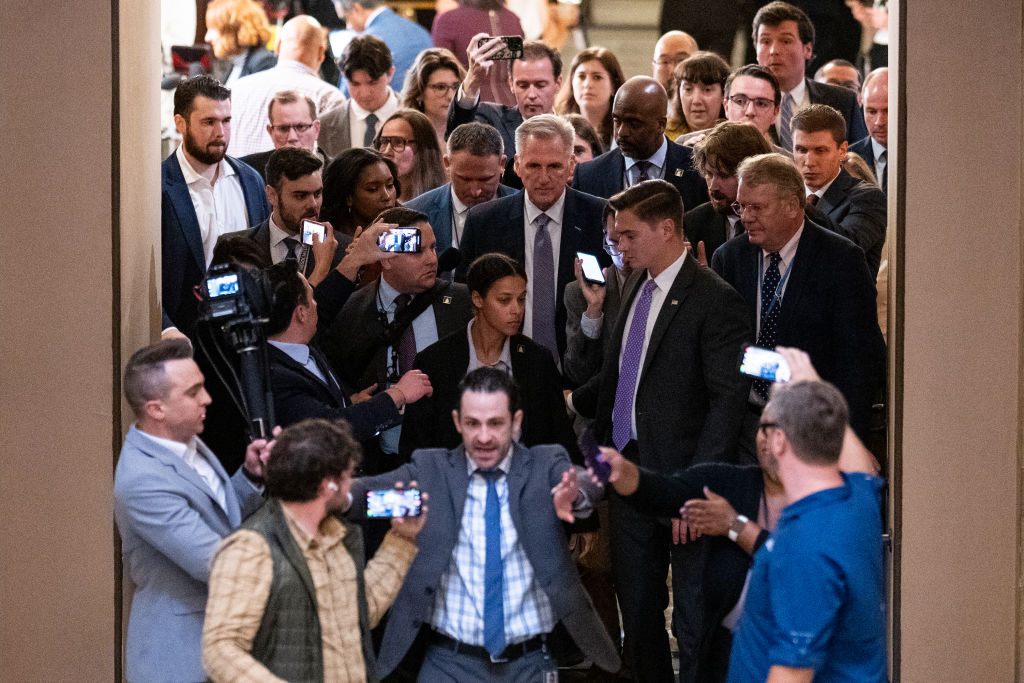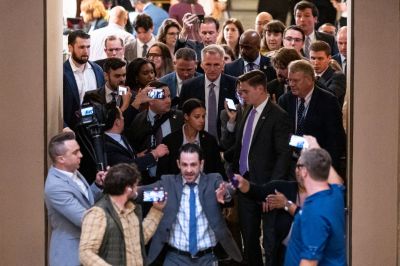One of the unexpected joys of parenthood is reencountering Mother Goose. The charming old poems collected as fare for very young children are full of frank, often quite bracing, folk wisdom. One of my favorites is this classic warning:
If wishes were horses, beggars would ride.
If turnips were watches, I’d wear one by my side.
If “ifs” and “ands” were pots and pans,
There’d be no work for tinkers’ hands.
We may desire something ever so earnestly, but our doing so has no bearing on whether we will get it. That is a helpful lesson for children and parents alike, and one that should now be heeded by those members of the House of Representatives rooting for a government shutdown.
Many House Republicans observe, correctly, that our nation’s fiscal trajectory is looking grimmer by the moment. They feel, correctly, that the Fiscal Responsibility Act of 2023, which came out of the debt ceiling confrontation this spring, does not measure up to the immensity of the problem.
They also feel that if the House refuses to fund the government at current levels, bringing on a government shutdown starting on October 1, they will somehow correct this problem. Rep. Greg Steube, for example, told Chad Pergram of Fox News: “People in my district are willing to shut the government down for more conservative fiscal policy to put us on a path to balancing our budget at least in ten years.”
I also would be pleased to sign up for that trade. Unfortunately, turnips are not watches and a willingness to vote down appropriation bills is not an actual legislative strategy, let alone a winning one that can put America on a sustainable fiscal path. If shutdowns were solutions, America would be debt free. But there is absolutely no reason to believe that a better fiscal outcome will be found on the other end of a government shutdown. Just the opposite is likely the case.
Republicans who favor a shutdown rightly note that it will not entail some kind of debilitating crisis for the country (in contrast to a debt default). Current law keeps a large portion of federal workers on the job, deeming their functions essential. That includes military and health care personnel, as well as the workers needed to ensure that mandatory spending such as Social Security (which is not subject to annual appropriations) continues uninterrupted. Most Americans therefore won’t immediately feel the impact of a shutdown, and might be inclined to think of it as just one more strange aspect of Washington politics.
But just because a shutdown won’t bring about immediate disaster doesn’t mean it will be a useful form of political leverage.
Each day of the shutdown will bring us closer to active duty military members, park rangers, VA nurses, and other politically sympathetic federal employees missing paychecks. The Democrat-controlled Senate looks on track to pass a relatively clean continuing resolution, offering to keep the government open at current funding levels while negotiations on the final spending bills continue. (The bipartisan bill currently moving toward passage does include $6 billion in funding for Ukraine, which somewhat complicates things because of House GOP opposition.) If it does so, there’s good reason to believe the national media will portray congressional Republicans as responsible for the shutdown’s harms (and not unreasonably). If past experience is any guide, Republicans will find it hard to avoid simply agreeing to Democrats’ terms, as they largely did in 1996, 2013, and 2019.
For Republicans to make a bargaining breakthrough, they will need to unite behind a proposal that could realistically structure a negotiation with Senate Democrats and President Joe Biden. They managed to do so in the spring, much to the surprise of those who believed the conference would be utterly incapable of supporting any bill that raised the debt ceiling. Re-running that maneuver has proven impossible for Republicans so far, and it seems unlikely that they will manage something like it by week’s end.
Republicans are therefore in danger of choosing a shutdown simply by default, without any clear “ask” for ending it. As House Speaker Kevin McCarthy has lamented, this is extremely counterproductive. “If people want to close the government, it only makes them weaker,” McCarthy said. “Why would they want to stop paying the troops or stop paying the border agents or the Coast Guard? I don’t understand how that makes you stronger. I don’t understand what point you’re trying to make.”
Even if House Republicans do manage to pass their own bill(s), it is far from obvious how they would convert that success into a workable compromise on annual spending. As far as Democrats are concerned, nothing about the situation has changed to warrant deviating from the spending levels agreed to in the spring. They will ask why fiscal year 2024 spending bills must be the occasion for making a hard turn toward austerity—and many Republicans, including moderates and defense hawks, will agree with them. What Republicans lack are goals they might realistically get Democrats to agree to, goals for which GOP legislators can make a strong case that they have the more reasonable agenda.
The political tinkers responsible for fashioning a responsible federal budget have their work cut out for them in the years to come. We may wish it were otherwise, but then again we may wish for many things.





Please note that we at The Dispatch hold ourselves, our work, and our commenters to a higher standard than other places on the internet. We welcome comments that foster genuine debate or discussion—including comments critical of us or our work—but responses that include ad hominem attacks on fellow Dispatch members or are intended to stoke fear and anger may be moderated.
With your membership, you only have the ability to comment on The Morning Dispatch articles. Consider upgrading to join the conversation everywhere.